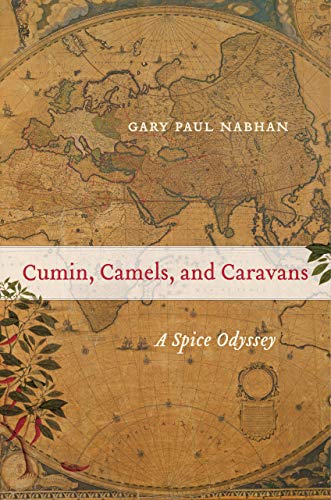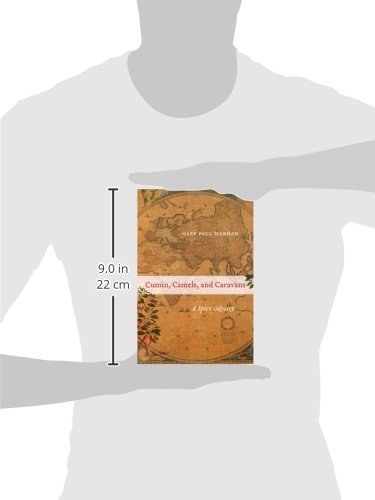Customer Services
Copyright © 2025 Desertcart Holdings Limited
Desert Online General Trading LLC
Warehouse # 7, 4th Street, Umm Ramool, Dubai, 30183, Dubai




Cumin, Camels, and Caravans: A Spice Odyssey
M**D
Interesting subject but below my expectations
I had previously read Food, Genes and Culture and thoroughly enjoyed and thought it was well researched. When I first heard of this book I was quite excited. However, several things made this book fail to meet my expectations. First, a significant part of the book is like a travel narrative where the author is describing his visits to some of the historic trading centers. There's nothing wrong with that, but personally I'm less interested in his travels and reflection on the locations' modern day manifestations rather than the history. In addition, the author seems to make a lot of assumptions about his family's own history, based on his family name alone. While many of may do this, it's not history without other supporting evidence. Second, regarding the history, I found some parts of the book poorly researched and many facts without referenced footnotes. The author is not a scholar of history so I think he needs to support some of his facts. In particular, chapter 5, entitled "Mecca and the Migrations of Muslim and Jewish Traders" had some gaping inaccuracies. The author confuses the black stone with the Ka'ba itself, confuses the Umayyad tribe/clan with that of the Quraysh itself (although correctly identified it as a sub-clan later on in the book), mentions a chapter of the Quran called 1001 nights which does not exist, quotes a verse from the non-existent chapter which of course also doesn't exists, etc. All these mistakes made me question how many other mistakes there are in subjects that I'm less familiar with. Third, the author fails to make compelling arguments for some of his theories. He argues that demand for aromatics (spices), in part encouraged by the myth-making of their benefits and rarity by traders, engendered globalization. However, there was not extensive evidence of this myth-making or at least who was doing it. In addition, the theory failed to address why other items (non-aromatics) couldn't also have driven this globalization. Fourth, the author has followed many others by exaggerating the existence of a silk road, it terms of how we imagine a modern highway and trade networks. He should of examined other scholarly works like Dr. Valerie Hansen's book "Silk Road" which dispels some of those myths. Fifth, it has one of the worst lines I've ever read, especially in context of a history book where he says "Good cultural history, perhaps like passionate lovemaking, is always messy, and sometimes a bit sticky as well." Sixth, the author fails to provide a convincing argument, even admitting that do such evidence really exists, that crypto Jews and Muslims in the New World, were able to establish trade networks with their brethren in the Old World, and that they played a significant role in moving spices east and west. A good portion of the book discussed this but it essentially is speculation and the best evidence, being the similarity of some dishes or spice mixes in the New and Old Worlds, is not accepted as direct or certain evidence by culinary history scholars. Seventh, the rhythm of the book is very disrupted. The book has several text boxes in the main text to discuss the history of certain spices and recipes. The spice descriptions often repeat many facts already mentioned in the main narrative. I would prefer it as being in annexes. Unfortunately, the parts of the book I enjoyed most, were hampered by the fact I was always doubting the historical accuracy of those sections due to issues I found in other areas of the book as previously mentioned. I wouldn't recommend this book to others especially if you read some of Nabhan's better researched books.
D**N
MUST READ A remarkable look at the way spices led to global markets and interconnection
A remarkable book with depth and breadth about spices and how they shaped global trade and development. Absolutely stunning! Gary blends history, travel and recipes as he follows old spice pathways and his long ago clan around the midEast. One of the first to realize how important the trade in spice was - reaching thousands of miles and building multicultural trading networks. A must for world hisotry buffs (and teachers), spice-aholics or adventurous chefs.
T**S
Four Stars
Well-written and full of great historical information. A bit slow here and there, but overall a good read.
R**T
Five Stars
A very useful addition when studying the Middle East and the Silk Road. Great book.
G**S
you will enjoy it, if not there are many
The terms, esoteric, and very advanced come to mind. If you have an advanced knowledge of the history of the spice trade you will find it enjoyable. It is a first person travel log and, a history of the several spice routes, with insets, describing various spices, scattered throughout it's pages. While it is thorough, you will need a language translation program and , google maps to be able to understand and keep track of his journey. if this description peeks your interest this book is for you, you will enjoy it, if not there are many, more basic, books that you can start your journey with
Trustpilot
5 days ago
2 months ago